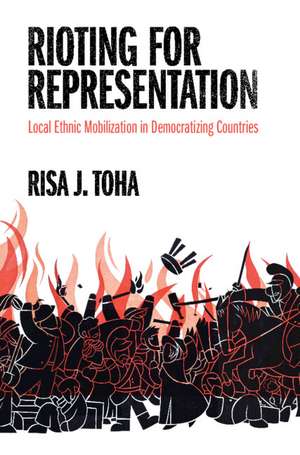Rioting for Representation: Local Ethnic Mobilization in Democratizing Countries: Problems of International Politics
Autor Risa J. Tohaen Limba Engleză Hardback – 3 noi 2021
| Toate formatele și edițiile | Preț | Express |
|---|---|---|
| Paperback (1) | 200.84 lei 3-5 săpt. | +18.12 lei 7-13 zile |
| Cambridge University Press – 21 mar 2024 | 200.84 lei 3-5 săpt. | +18.12 lei 7-13 zile |
| Hardback (1) | 697.28 lei 6-8 săpt. | |
| Cambridge University Press – 3 noi 2021 | 697.28 lei 6-8 săpt. |
Preț: 697.28 lei
Preț vechi: 783.47 lei
-11% Nou
Puncte Express: 1046
Preț estimativ în valută:
133.43€ • 139.59$ • 110.84£
133.43€ • 139.59$ • 110.84£
Carte tipărită la comandă
Livrare economică 02-16 aprilie
Preluare comenzi: 021 569.72.76
Specificații
ISBN-13: 9781316518977
ISBN-10: 1316518973
Pagini: 355
Dimensiuni: 158 x 235 x 22 mm
Greutate: 0.6 kg
Editura: Cambridge University Press
Colecția Cambridge University Press
Seria Problems of International Politics
Locul publicării:Cambridge, United Kingdom
ISBN-10: 1316518973
Pagini: 355
Dimensiuni: 158 x 235 x 22 mm
Greutate: 0.6 kg
Editura: Cambridge University Press
Colecția Cambridge University Press
Seria Problems of International Politics
Locul publicării:Cambridge, United Kingdom
Cuprins
1. Introduction; 2. Exclusion and violence during democratic transitions; 3. The emergence of identity-based cleavages in Indonesia; 4. Ethnic politics in Soeharto's new order regime; 5. Golkar's dominance and ethnic riots; 6. Micro dynamics of exclusion and riots; 7. How riots dissipated; 8. Conclusion; Glossary; References: Index.
Recenzii
'Riots and Representation uses rich data and careful fieldwork in Indonesia to shed new light on the old problem of ethnic conflict during political transitions. Rather than attributing violence to regime, emotions, or economic grievances, Risa Toha shows convincingly that political actors use violence together with other strategies to seek recognition and accommodation during moments of political change.' Tom Pepinsky, Walter F. LaFeber Professor of Government and Public Policy, Cornell University
'All too often, democratic transitions are accompanied by ethnic violence. Risa Toha persuasively argues and meticulously demonstrates that in Indonesia, the largest country to democratize since the Cold War, transitional violence was less an expression of ethnic hatred than of political voice. Her central lesson that young democracies must quickly build new institutions to secure widespread political inclusion should resonate far beyond Indonesia's shores.' Dan Slater, Ronald and Eileen Weiser Professor of Emerging Democracies, University of Michigan
'Risa Toha offers a satisfyingly straight-forward explanation for ethnic rioting across sub-national districts in Indonesia during democratic transition. Accounting for specific features of Indonesia, Toha's parsimonius explanation generates a surprising number of implications, which are tested using a mix of methodological approaches. In this rich account of Indonesian politics, the author reminds us of the importance of a grounded understanding of local politics. This book offers a framework that likely will elucidate sub-national variation of ethnic political rioting across many other ethnically diverse political transitions.' Jóhanna Kristín Birnir, Professor, Department of Government and Politics, University of Maryland
'What causes inter-group violence in Indonesia and other transitional democracies? Showing why explanations often derived from other institutional contexts just don't work, Risa Toha's new book convincingly demonstrates that violence in Indonesia has been the tactic of local and excluded political groups. The good news, though, is that various tactics of political inclusion have been effective in reducing violence once it breaks out. A must read for all those interested in Indonesia, and in the broader causes of ethnic violence.' Steven Wilkinson, Nilekani Professor of India and South Asian Studies, Yale University
'All too often, democratic transitions are accompanied by ethnic violence. Risa Toha persuasively argues and meticulously demonstrates that in Indonesia, the largest country to democratize since the Cold War, transitional violence was less an expression of ethnic hatred than of political voice. Her central lesson that young democracies must quickly build new institutions to secure widespread political inclusion should resonate far beyond Indonesia's shores.' Dan Slater, Ronald and Eileen Weiser Professor of Emerging Democracies, University of Michigan
'Risa Toha offers a satisfyingly straight-forward explanation for ethnic rioting across sub-national districts in Indonesia during democratic transition. Accounting for specific features of Indonesia, Toha's parsimonius explanation generates a surprising number of implications, which are tested using a mix of methodological approaches. In this rich account of Indonesian politics, the author reminds us of the importance of a grounded understanding of local politics. This book offers a framework that likely will elucidate sub-national variation of ethnic political rioting across many other ethnically diverse political transitions.' Jóhanna Kristín Birnir, Professor, Department of Government and Politics, University of Maryland
'What causes inter-group violence in Indonesia and other transitional democracies? Showing why explanations often derived from other institutional contexts just don't work, Risa Toha's new book convincingly demonstrates that violence in Indonesia has been the tactic of local and excluded political groups. The good news, though, is that various tactics of political inclusion have been effective in reducing violence once it breaks out. A must read for all those interested in Indonesia, and in the broader causes of ethnic violence.' Steven Wilkinson, Nilekani Professor of India and South Asian Studies, Yale University
Notă biografică
Descriere
Toha explains why ethnic groups engage in violence during political transition, and why and how this violence eventually declines.
















